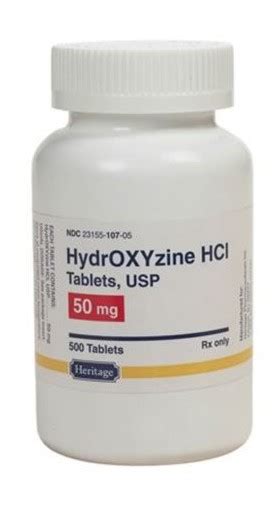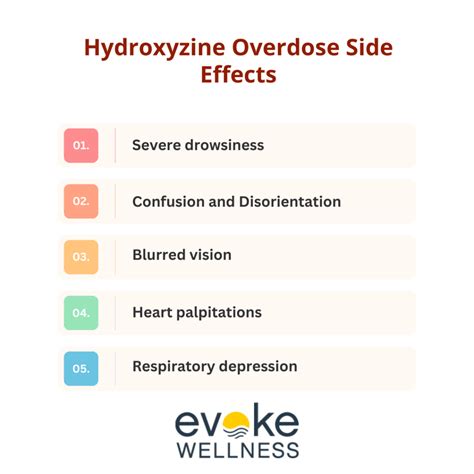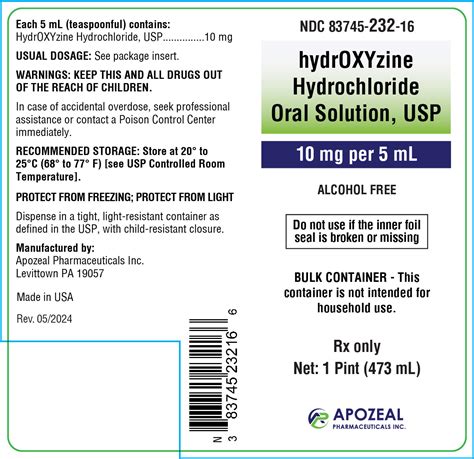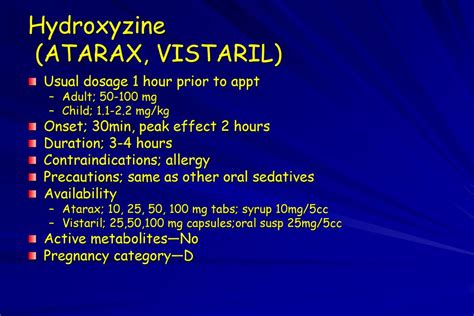Intro
Discover key facts about Hydroxyzine, an antihistamine medication, including its uses, side effects, and interactions, to understand its role in treating anxiety and allergic reactions effectively.
Hydroxyzine is a medication that has been widely used for various purposes, including the treatment of anxiety and itching. Despite its common use, there are many facts about hydroxyzine that are not well-known to the general public. In this article, we will delve into the world of hydroxyzine and explore its uses, benefits, and side effects. Whether you are a medical professional or simply someone who is curious about this medication, you will find the information in this article to be informative and enlightening.
Hydroxyzine has been used for decades to treat a variety of conditions, including anxiety, insomnia, and itching. It is a type of antihistamine, which means that it works by blocking the action of histamine, a chemical that is released by the body's immune system. Histamine is responsible for causing many of the symptoms associated with allergies, such as itching, sneezing, and runny nose. By blocking the action of histamine, hydroxyzine is able to provide relief from these symptoms.
One of the most interesting things about hydroxyzine is its ability to be used for a variety of purposes. In addition to treating anxiety and itching, it is also used as a sedative and as an antiemetic, which means that it can be used to prevent nausea and vomiting. This makes it a versatile medication that can be used in a variety of situations. Whether you are experiencing anxiety, itching, or nausea, hydroxyzine may be a useful medication to consider.
What is Hydroxyzine?

How Does Hydroxyzine Work?
Hydroxyzine works by blocking the action of histamine, which is a chemical that is released by the body's immune system. Histamine is responsible for causing many of the symptoms associated with allergies, such as itching, sneezing, and runny nose. By blocking the action of histamine, hydroxyzine is able to provide relief from these symptoms. In addition to its antihistamine properties, hydroxyzine also has sedative and antiemetic effects, which makes it useful for treating anxiety, insomnia, and nausea.Uses of Hydroxyzine

Benefits of Hydroxyzine
The benefits of hydroxyzine are numerous and well-documented. Some of the benefits of hydroxyzine include: * Fast and effective relief from anxiety and insomnia * Relief from itching and hives * Prevention of nausea and vomiting * Treatment of allergies and allergic reactions * Relief from symptoms of motion sickness * Sedative and antiemetic effectsSide Effects of Hydroxyzine

Precautions and Warnings
While hydroxyzine is generally considered to be safe and effective, there are some precautions and warnings that should be taken into consideration. Some of the precautions and warnings include: * Hydroxyzine should not be taken by people who are allergic to antihistamines * Hydroxyzine should not be taken by people who have a history of glaucoma or urinary retention * Hydroxyzine should not be taken by people who are pregnant or breastfeeding * Hydroxyzine should not be taken by people who have a history of heart disease or high blood pressure * Hydroxyzine should not be taken by people who have a history of liver or kidney diseaseInteractions with Other Medications

Overdose and Toxicity
While hydroxyzine is generally considered to be safe and effective, it can be toxic in large doses. Some of the symptoms of hydroxyzine overdose and toxicity include: * Confusion and disorientation * Drowsiness and coma * Seizures and tremors * Nausea and vomiting * Abdominal pain and diarrheaDosage and Administration

Storage and Disposal
Hydroxyzine should be stored in a cool, dry place, away from direct sunlight and moisture. It should be kept out of reach of children and pets, and should be disposed of properly when it is no longer needed.Conclusion and Final Thoughts

We hope that this article has provided you with a comprehensive understanding of hydroxyzine and its uses. If you have any questions or comments, please don't hesitate to reach out to us. We would love to hear from you and help you in any way that we can.
What is hydroxyzine used for?
+Hydroxyzine is used to treat a variety of conditions, including anxiety, insomnia, and itching. It is also used as a sedative and as an antiemetic, which means that it can be used to prevent nausea and vomiting.
What are the side effects of hydroxyzine?
+The common side effects of hydroxyzine include drowsiness and dizziness, dry mouth and dry eyes, headache and fatigue, nausea and vomiting, constipation and diarrhea, and increased heart rate and blood pressure.
Can hydroxyzine be taken with other medications?
+Hydroxyzine can interact with other medications, which can increase the risk of side effects. It is recommended to consult with a healthcare professional before taking hydroxyzine with other medications.
What is the dosage of hydroxyzine?
+The dosage of hydroxyzine will depend on the specific condition being treated. The common dosages and administration routes include oral tablets, oral syrup, intramuscular injection, and intravenous injection.
Is hydroxyzine safe for pregnant women?
+Hydroxyzine should not be taken by people who are pregnant or breastfeeding, as it can cause harm to the fetus or baby. It is recommended to consult with a healthcare professional before taking hydroxyzine during pregnancy or breastfeeding.
